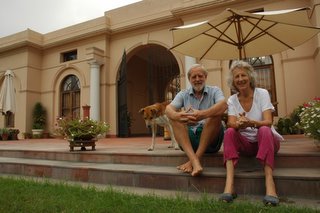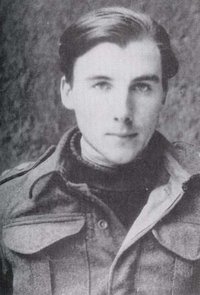Susan Hill rant on Charkinblog
Also in today's blog
A novel in a year
Beautiful, grammatical English
The elusive commando, adventurer, author
Mrs Fraser's misadventures
Mix-up at Orion website
Susan Hill rant at Charkinblog
I have to thank The Bookseller's Breaking News Briefing, edited by Philip Jones, for alerting me to the Charkinblog, the official blog of Richard Charkin, chief executive of the UK publishing house of Macmillan founded in 1843.

[The picture of Professor Charkin is borrowed from The Friday Project "a new publishing house, specialising in bringing together the worlds of print publishing and web publishing. Our aim is to turn the web's best sites into the world's best books."]
At Professor Charkin's blog, on Friday morning, I enjoyed reading a splendid rant [posted on January 7] about the shortcomings of some independent booksellers by novelist Susan Hill.
"What is all this about small independent bookshops being everything wonderful ? Some may be. But on a recent small independent survey I found nothing to cheer me, much that was either depressing, infuriating or both."

"There are thousands of books which could be stocked by small independents to their advantage, books from the back list, unusual books, books from the many, many small publishers, books which are at the back of the catalogues from the big publishers, who stick the bestsellers at the front. Books you will not know about until you browse and discover, books which tempt you, quirky books, novels you had forgotten, biographies of un-obvious people, the book-road less travelled. If I owned a small bookshop I would not even bother to stock the top ten, the latest blockbusters, the new Harry Potter and Dan Brown, though any of them could be obtained the next day to special order. The book wholesalers give a superb service to independent shops."
Novelinayear
Friends who came to lunch last Sunday brought me the books supplement of the previous day's issue of the UK newspaper jocularly known as The Torygraph. On the back page, it had an article they thought would interest me.
It was headed Anovelinayear "The acclaimed novelist Louise Doughty here introduces a unique new column teaching the art of fiction."
As you know, despite being sequestered in the backwoods of Spain, I keep a pretty close eye on the British publishing industry by reading the weekly trade magazines. I had not heard of
Ms Doughty before, or, if I had, her name had not stuck in my mind. However that evening I read her article and found it full of the usual waffle written or spoken by people attempting to teach what cannot be taught.
Judging by the
photograph of Ms Doughty lying on a rug with her chin on her hands and an open laptop on the floor in front of her, she is extremely "promotable" i.e. young and attractive. She tells us that her third novel was sold on the strength of a one-page proposal and the advance bought a flat. If the flat is in London, it must have been a large advance. Last year, the British Council, funded
her trip to Sri Lanka to teach creative writing workshops to young people in the capital, Colombo, and in Kandy, the second city.
On the special Novelinayear messageboard, visitors are asked to complete the sentence "The day after my eighth birthday, my father told me ..." The last time I looked, on Friday evening, 1,348 people had done so.
"Beautiful, grammatical English"
"We are so used to the deterioration of our language that we forget how sloppy and thin spoken English has become." Hear, hear to that comment by Alexander McCall Smith, in an article in last Sunday's issue of The Times. He went on, "Then we go somewhere like India and we hear the language used well and we may reflect on what we are losing."
He had been reminded of the deterioration by a garden walk with "Sunil Sethi, who runs a popular book programme on Indian television. Indian media intellectuals still speak beautiful, grammatical English of the sort spoken on the radio in this country with such skill and ease by the likes of James Naughtie."
The Scottish author was staying at one of the most beautiful houses I have seen in my web travels. I only wish I had known about it when I was travelling in India a few years ago.
In his piece headed "The roving novelist Alexander McCall Smith journeys to India, and finds an enterprising outpost of English country life transported to the plains and mountains of Rajasthan", McCall Smith writes
At breakfast time we met our host, and that was when the whole notion of Tikli Bottom became clear. Martin Howard is an Englishman with a naval sense of humour. He is a tall, distinguished-looking man who came to India in 1984 as naval attaché at the British Embassy. His period of office was somewhat longer than usual, as he spent a year at the Indian National Defence College, and during the four years of his posting he became attached to the country.

The elusive commando, adventurer, author
A good deal of this week's blogging-time has been spent trying to trace the literary agent, or executor, of an author whose books I have yet to read and whose reputation was previously unknown to me.
On Tuesday, turning out a cupboard in my workroom, I came across a year-old newspaper containing obituaries of two men whose books I look forward to reading as soon as I can get hold of copies.
One was the internationally famous Italian conductor, Massimo Freccia, whose autobiography The Sounds of Memory was published in 1990 when he was 84. Said to be one of the last men to fight a duel, he died, aged 98, in December 2004.

The other man, see photograph, was Michael Alexander, described by one of his obituarists as "soldier, adventurer, incurable romantic and author". He was also a restaurateur, first at The Gasworks off the King's Road in London. Later he opened Chelsea Wharf where his first chef was Marco Pierre White.
During WW2, Michael Alexander was imprisoned at Colditz, one of the group of prisoners known as Prominente because of their royal or other illustrious connections. As the war was ending, Hitler signed their death warrants, but the German officer in charge of them decided not to carry out the order.
The books Alexander wrote were
The Privileged Nightmare 1952 [reprinted 1975 as Hostages in Colditz]]
Offbeat in Asia 1953
The Reluctant Legionnaire 1955
The True Blue 1957
Mrs Fraser on the Fatal Shore 1972 [reprinted 2001]
In 1836,the barque Stirling Castle was wrecked on the Great Barrier Reef and the crew and the captain's wife, Mrs Fraser, were cast ashore on the coast of what is now Queensland. Captured by aborigines with cannibalistic tendencies, Captain Fraser and his wife were stripped naked and driven into the bush. Fraser was then murdered and his wife, a lady of genteel upbringing, was tortured and made to perform humiliating tasks as the slave of the tribe. Having given birth in an open boat, her baby was immediately drowned and she was forced instead to mother an aboriginal child 'one of the most deformed and ugly looking brats my eyes ever beheld'. A remarkable rescue by an Irish convict, posing as a 'ghost' of a dead warrior, saved Mrs Fraser whose subsequent misadventures in England provide an intriguing finale to this extraordinary story.
Omai : Noble Savage 1977

Queen Victoria's Maharajah 1980 [reprinted 2001]
On the Orion website, this author's bio reads
Michael Alexander was educated at Stowe and Sandhurst. He was in the Commandos during the war, was captured behind the German line in North Africa and imprisoned for two-and-a-half years in the notorious Colditz Castle…After the war he became Assistant Private Secretary to Sir Alec Douglas-Home and James Callaghan MP, and was Private Secretary to prime minister Margaret Thatcher.
Puzzled, I emailed Orion's publicity department to query the last sentence and suggest that perhaps there had been a biographical mix-up with another of their distinguished authors. I was told that unfortunately they didn't have any contact/agent details for him on their system. I then tried the Society of Authors who couldn't help but Alison Watson advised me to ask the Public Lending Right people and check the WATCH [Writers, Artists and their Copyright Holders] site.
I drew a blank at both, but was advised by Janice Forbes of PLR to try the Authors' Licensing and Collecting Society. Before I emailed the ALCS, two things happened. First, I found an obituary of Sir Michael Alexander, "a formidably intelligent and effective diplomat". There was now no doubt that somehow Orion had mixed up two men with the same name.
Next, my eye was caught by a Dick Francis paperback, To The Hilt, I didn't think I had read. It was on a shelf where Mr Bookworm keeps his not-yet-read collection. Opening it to check the publication date [1997] I saw, on the opposite page, a verse from a poem called Bede's Death Song. "From The Earliest English Poems, translated by Michael Alexander (Penguin Books, Third Edition 1991)"
Now the situation was complicated by a third Michael Alexander. I mentioned both the other men of that name when emailing the ALCS.
On Friday I heard from Jean-Paul Sparkes, Deputy Licensed Works Manager, that they did have a reference to Michael Alexander on their system but "unfortunately I cannot disclose the address for data protection reasons. However, I could forward any correspondence for you."
There, for the moment, the matter rests. But I was impressed and warmed by the helpfulness of everyone I consulted.
My review of Readers' Review, mentioned last Sunday, is held over till next Sunday.
